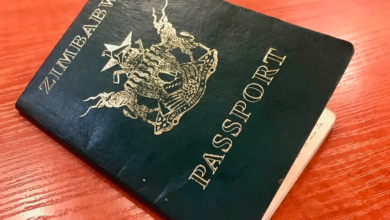
Nhlanhla ‘Lux’ Dlamini, the former leader of the controversial anti-immigrant movement “Operation Dudula,” has recently made headlines for a surprising shift in stance. In a notable departure from his previous anti-immigrant rhetoric, Dlamini has expressed solidarity with Zimbabweans protesting in Pretoria over the exorbitant costs of e-passports.
Zimbabweans have long grappled with severe economic challenges, and the high prices for essential services and goods have exacerbated their struggles. An ordinary Zimbabwean passport costs approximately US$150, while an emergency passport is priced at US$250. In stark contrast, a South African passport costs around R600 (US$33). This disparity highlights not only the economic challenges faced by Zimbabweans but also underscores the broader issues of affordability and access to essential services.
The high costs are compounded by widespread corruption in Zimbabwe, where hidden fees and bribes inflate prices. Such practices, driven by rent-seeking and corruption, place an additional financial strain on ordinary citizens, who are already grappling with widespread poverty and exploitation.
Dlamini’s support for the Zimbabwean protesters marks a significant turn from his earlier anti-immigrant stance. Known for his leadership in “Operation Dudula,” which was characterized by its opposition to illegal immigration and its sometimes harsh tactics, Dlamini’s new position reflects a nuanced understanding of the complexities surrounding immigration and economic hardship.
By aligning himself with the protesters, Dlamini appears to be acknowledging the broader issues that contribute to migration and economic displacement. His support signals a recognition of the systemic problems faced by Zimbabweans, including the burdens imposed by corruption and the high costs of essential services.
This shift in perspective comes at a crucial time as the economic situation in Zimbabwe continues to deteriorate. The protests in Pretoria are a manifestation of growing frustration among Zimbabweans who are seeking relief from the oppressive financial burdens they face. The international community has been watching these developments closely, with many observers hoping that increased awareness and support will lead to meaningful changes in both Zimbabwean policies and regional attitudes towards immigration.
Dlamini’s new stance highlights the importance of addressing the root causes of migration and economic hardship. It underscores the need for solidarity and support across borders, recognizing that the struggles of Zimbabweans are not just an issue for their own country but a matter of regional and global concern.
In other news – Elon Musk files lawsuit against Unilever and Mars over X boycott
Elon Musk’s social media platform, X (formerly Twitter), has launched a lawsuit against several major corporations and a trade association, alleging a coordinated effort to boycott the site and deprive it of significant advertising revenue. The lawsuit names food giants Unilever and Mars, private healthcare company CVS Health, renewable energy firm Orsted, and the World Federation of Advertisers (WFA) as defendants.
The legal action, filed over grievances stemming from 2022—the year Musk acquired Twitter—accuses these entities of conspiring to withhold advertising revenue from X. This period marked a sharp decline in ad revenue for the platform, attributed by X to concerns over Musk’s commitment to managing harmful content on the site. Read More











